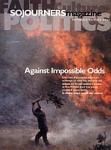"During this current crisis," Rabbi Arik Ascherman said, "the question in front of my eyes has always been: What can we say that people can hear?"
The "we" are members of the 13-year-old group Rabbis for Human Rights, the oldest rabbinical coalition in Israel, comprised of more than 90 Reform, Orthodox, Conservative, and Reconstructionist rabbis and students. Their motivation for organizing? Human rights abuses by Israeli military authorities in the suppression of the Palestinian intifada.
"Our position is that violence on all sides is wrong, and we've been very straightforward with the Palestinians we work with that we find hostility and violence, as well as the threat of violence, both morally unacceptable and, frankly, strategically counterproductive," Rabbi Ascherman, co-director of the human rights group, said on a visit to Sojourners in May. "As far as I'm concerned, when the historians write about this intifada, it's going to be seen as a step back and not as an advance of the Palestinian cause. At the same time, we don't accept the proposition of symmetry [that both sides are equally responsible for the violence], because at the end of the day, Israel holds most of the cards in her hands."
The rabbis have brought human rights grievances to the attention of the Israeli public, protested the demolition of Palestinian homes, and organized on behalf of foreign workers, women, Ethiopian Jews, and Jahalin Bedouin-who have been negotiating for decent living conditions after their houses were destroyed. They've also taught students about Judaism and human rights and Islam and human rights, and promoted the welfare and human rights of Jewish Israelis and of non-Jews. They use a combination of strategies that include lobbying, organizing public campaigns, direct advocacy, and sometimes civil disobedience.
"How do we break through [Israelis] feeling threatened and angry and in pain and fearful to [help them] understand a little bit of what's going on here?" asked Ascherman. "Right now, we're in a situation where if you put a peace proposal on the table tomorrow, neither side would take it because things are so inflamed. How do we get people to stand down?
"The bottom line is that actions speak louder than words. While the negotiations are going on, [what's happening] on the ground-land expropriations, water allocation, the control of Palestinian life, demolitions, tree uprootings-is not a peace process for the Palestinians," Ascherman said. "In terms of the Israeli public, there is no quick fix. And what we're going to have to do, more and more, is go around and speak in small groups and to individuals."
Molly Marsh is an assistant editor of Sojourners. For more information, see www.rhr.israel.net.

Got something to say about what you're reading? We value your feedback!
